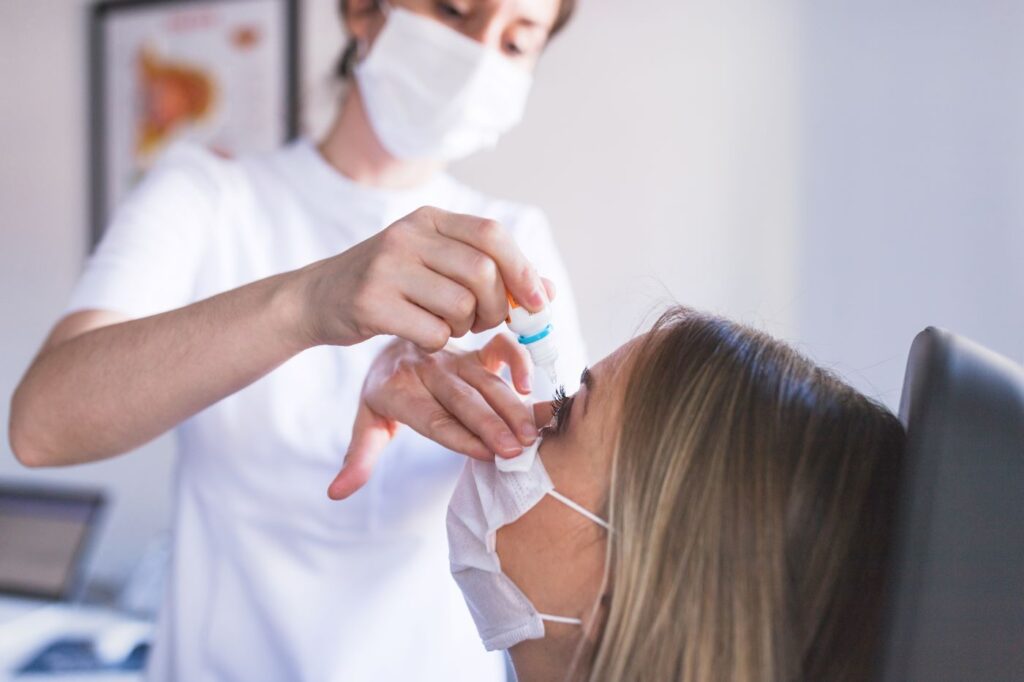Prescription Medications for Dry Eye Treatment
Dry Eyes Treatment Options in East Stroudsburg, PA
Dry eye syndrome occurs when your eyes do not produce enough tears or when the tears evaporate too quickly. The result is eyes that feel dry, gritty, burning, or tired. While many people manage mild symptoms with over-the-counter solutions, others require prescription medications to find real relief and protect their eye health long-term. Pocono Eye Associates offers a look at some of these prescription dry eyes treatment options for patients in East Stroudsburg, PA.

What Is Dry Eye?
Dry eye is a condition where the eyes cannot maintain a healthy layer of tears. Tears are essential for eye lubrication, removing debris, and protecting against infection. When this delicate balance is disrupted, the eyes become irritated and inflamed. Dry eye can be temporary or chronic, and severity can vary from mild discomfort to significantly impaired vision.
What Causes Dry Eyes?
Dry eyes can be triggered by a variety of factors. Five of the most common factors include:
- Aging – As we age, tear production naturally declines. People over 50, especially women, are more likely to develop dry eye due to hormonal changes associated with menopause.
- Environmental Conditions – Wind, smoke, dry air, and extended exposure to screens can all speed up tear evaporation. These factors can make dry eye symptoms worse, especially in climates with low humidity or high pollution.
- Medical Conditions – Autoimmune disorders like rheumatoid arthritis and lupus often involve dry eye as a symptom. Diabetes and thyroid disorders can also affect tear production and eye surface health.
- Medications – Many commonly prescribed medications, including antihistamines, antidepressants, and blood pressure drugs, list dry eye as a side effect. These medications can interfere with tear production or quality.
- Contact Lens Use and Eye Surgery – Long-term use of contact lenses and refractive surgeries can affect the tear film or corneal sensitivity, contributing to dry eye symptoms.
Prescription Medications for Dry Eye
When over-the-counter treatments aren’t enough, our eye doctors at Pocono Eye Associates may recommend prescription medications to reduce inflammation and increase tear production. Let’s look at three common prescription options:
- Cyclosporine – Cyclosporine is an anti-inflammatory medication that increases tear production in people whose tear production is reduced due to eye inflammation. Available as an eye drop, it helps suppress the immune system’s overactivity, which leads to inflammation in the tear-producing glands. Cyclosporine typically takes several weeks to show noticeable improvement, and consistent use is essential for maximum benefit.
- Eysuvis – Eysuvis is a corticosteroid eye drop used to treat short-term symptoms of dry eye disease. Unlike other steroids, Eysuvis is specially formulated for safe use on the eyes and is approved for short-term (up to two weeks) treatment. It works quickly to reduce inflammation and irritation, making it a great option for flare-ups or severe cases. However, due to potential side effects like increased eye pressure, it should be used under close supervision.
- Varenicline Solution – Varenicline solutions are a newer prescription option that works differently. Instead of being applied to the eyes, it’s a nasal spray that stimulates the trigeminal nerve to boost natural tear production. This innovative approach bypasses the surface of the eye and encourages tear production from within. It’s especially useful for patients who struggle with applying eye drops or who don’t respond well to topical treatments.
Are Prescription Medications Right for You?
Not every case of dry eye requires prescription treatment. These medications are generally recommended when symptoms persist despite using artificial tears or home remedies. At Pocono Eye Associates, we will consider various factors before prescribing, including:
- The severity of your symptoms
- Any underlying health conditions
- The type of dry eye you are experiencing
- Your ability to adhere to a treatment plan
Tips for Managing Dry Eye Alongside Medications
Even when prescription medications are part of your treatment plan, additional measures can enhance their effectiveness. Natural treatment for dry eyes can also be implemented to support your eye health:
- Home Remedies and Lifestyle Adjustments – Use warm compresses to unclog oil glands, take regular breaks from digital screens, and ensure proper eyelid hygiene. These simple habits help maintain a healthier tear film and reduce symptoms.
- Environmental Changes – Use a humidifier at home, especially in dry climates or during winter. Avoid direct air from fans or car vents blowing into your eyes. Wearing wraparound sunglasses can also reduce wind exposure outdoors.
- Nutritional Support – Omega-3 fatty acids found in flaxseed oil and fish oil have been shown to improve tear quality and reduce inflammation. Staying hydrated and eating a balanced diet rich in antioxidants can support overall eye health as well.
Contact Pocono Eye Associates to Learn More
Dry eye syndrome can significantly impact your quality of life, but understanding the causes of dry eye is the first step toward effective treatment. However, treatment is not one-size-fits-all. Our doctors at Pocono Eye Associates will help determine the best approach based on your condition and needs and create a mild, moderate, or severe dry eye treatment plan. Reach out today to schedule a consultation to keep your eyes healthy.
